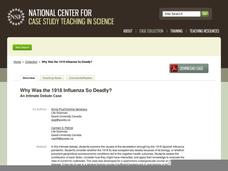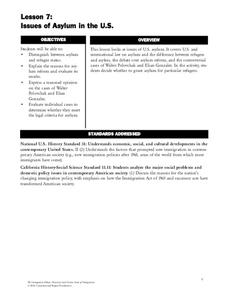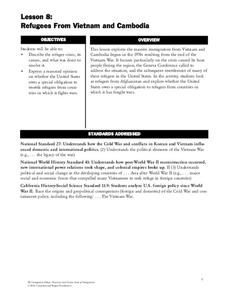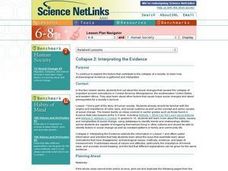Curated OER
Solar Energy in New York
Middle schoolers examine a variety of information for New York State including insolation data, and economic or political data, thus incorporating both science and social studies. Encouraging learners to become concerned citizens as they...
First Stage
A Charlie Brown Christmas
Charlie Brown may not feel the Christmas spirit this year, but your elementary students can use the season to practice important cross-curricular skills! A set of worksheets and activities based on A Charlie Brown Christmas guide apply...
Polar Trec
Animal Monitoring Introduction
Not only do mealworms taste great, they are also great for classroom science lessons. In pairs, young scientists observe and record what they see as they check out what their mealworms are doing from minute to minute. Each minute...
Wild BC
Carbon Sinks and Sources
Earth or environmental science pupils are assigned to be carbon sources or sinks. They ask yes-or-no questions to try to figure out which one they are. Then they discuss ways people can have positive effects on the changing climate by...
Redefining Progress
Have and Have-Not
Is there a correlation between a country's wealth and the extent of its ecological footprint? What exactly constitutes an ecological footprint, and how does one country stack up against the rest? This is a unique lesson to incorporate...
Polar Bears International
Taking Action!
Motivate young scientists to stand up and take action with this environmental science lesson. To begin, the class works in small groups brainstorming actions that support the conservation of the earth before creating and implementing an...
NPR
The History of America’s Weed Laws
To understand the laws regarding marijuana use in the United States, you can go all the way back to the 1800's to learn about farming hemp, or you can go back to 2018 when California became the sixth state to legalize recreational...
National Center for Case Study Teaching in Science
Why Was the 1918 Influenza So Deadly?
Which factor was more influential in the 1918 flu epidemic: biology, or social and political conditions? Your AP biology class will research and debate one of these positions in an interesting and challenging instructional activity....
Earth Day Network
Conserving Water Through Art!
Having fresh, clean drinking water is a privilege many people take for granted. Help raise awareness about the scarcity of water and the importance of conservation by discussing different ways water is used in everyday life. Brainstorm...
NOAA
A Watery World
With about 70% of the earth's surface covered in oceans, it's fair to say that we live in a very wet world. Young scientists gain a better appreciation of this fact as they use maps to identify the world's ocean basins in the first...
Peace Corps
Celebrating Our Connections Through Water
Water is vital for survival, but how does it help global cultures flourish? Elementary and middle schoolers learn about the different cultures around the world that celebrate water and incorporate it into their festivals or traditions.
Radford University
The Science of Surveys
To drill or not to drill? An informative unit has scholars first research the advantages and disadvantages of oil drilling in Alaska. They set up and conduct a sample survey to assess attitudes toward oil drilling in a specific...
Constitutional Rights Foundation
Plyler v. Doe: Can States Deny Public Benefits to Illegal Immigrants?
Illegal immigration is an ever-changing source of consistent controversy. A reading passage about the rights of undocumented workers and illegal immigrants—and the lack thereof—guides high schoolers into a mock trial activity. Three...
Constitutional Rights Foundation
Issues of Asylum in the U.S.
Who gets to come to the United States? Examine cases of individuals seeking asylum with an informative reading passage that includes examples, statistics, and representations of public opinion regarding asylum. Groups then go on to...
Constitutional Rights Foundation
Refugees From Vietnam and Cambodia
The United States may have pulled its troops from the Vietnam War in 1973, but the conflict was far from over for the citizens living in Asia at the time. An informative resource lets learners know about the wave of over 220,000...
University of Minnesota
Mirroring Emotions
Do you ever give your class the "teacher look"? Without saying a word, they become silent and engaged (hopefully). How do they know what you're thinking? Explore the concept of nonverbal communication and how it relates to our mirror...
Curated OER
Science NetLinks: Collapse 2: Interpreting the Evidence
Young scholars continue to explore the factors that contribute to the collapse of a society; they also explore how archaeological evidence is gathered and interpreted. Students explore about the social changes that caused the collapse...
Curated OER
Science: Finlay and Yellow Fever
Ninth graders research the work of Carlos J. Finlay and his contributions to science. Once they have discussed his theories about diseases, they create tables comparing diseases that use insects as carriers. The instructional activity...
Curated OER
Documenting the Great Depression
Students compare and contrast two photographs from the Great Depression, and identify the ways in which the photographers depicted the hardships of everyday life during this period. They hypothesize about the story behind each photograph...
Missouri Department of Elementary
Fly Your Kite
Encourage scholars to become a productive community member with a kite-themed lesson. Following a review and discussion, learners complete a Venn diagram that displays the connection between character traits needed to make a home and...
EduGAINs
Go Eco! Ecosystems
How is a movie theater like a desert biome? Compare systems to ecosystems with a set of activities that focuses on accessing multiple intelligences and building upon knowledge. As learners discuss the ways elements of an ecosystem depend...
Fluence Learning
Writing an Argument: The NIEHS
Should the work of the National Institute of Environmental Health Sciences be funded by the government? Middle schoolers weigh in on the status of federal funding for programs that protect the environment with three text passages and...
Mascil Project
Pottery
Don't cry over broken pottery. A cross-curricular lesson challenges pupils to consider how to restore ancient pottery. Using a computer program and their knowledge of transformations, they come up with a way to recreate the original...
Lee & Low Books
First Come the Zebra Teacher’s Guide
Accompany a reading of First Come the Zebra written and illustrated by Lynne Barasch with a teacher's guide equipped with before reading, vocabulary, and after reading activities. Additional social studies, science, music, art, math, and...
Other popular searches
- Social Science Role Play
- B Ed Social Science
- Unit Plan Social Science
- Social Science Lesson Plans
- Social Science Research
- Activity Social Science
- History and Social Science
- Social Science Powerpoint
- Social Science in Grade 3
- Social Science Methodology
- History Social Science
- Social Science Ducks

























